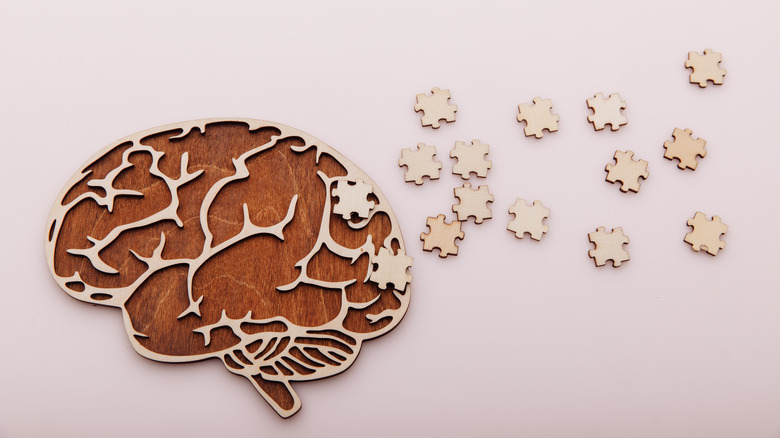What Is Aphantasia And Do You Experience It?
When you close your eyes and think of the word "school," are you able to perceive anything in your mind's eye? Can you picture desks and a whiteboard, or "hear" a bell signaling the end of class? Maybe you can imagine the faces of your childhood friends, almost as if you were there in real-time. Some may take this perceptual ability for granted, as 1% to 5% of the population struggles to visualize scenes, objects, or people in their minds using their imagination (per MindBodyGreen).
Because aphantasia had not been studied extensively until recently, it is not yet well understood by researchers. However, the mechanisms of this experience were initially introduced in 1880 by renowned scientist Francis Galton in his paper Statistics of Mental Imagery. Since then, more researchers have taken a special interest in how differences in the brain may relate to this mysterious lack of mental imagery. Dr. Adam Zeman, neurologist and professor of cognitive and behavioral neurology, gave aphantasia its name in 2015 after encountering a patient who lost their ability to visualize mental images following surgery (per Aphantasia Network).
Although the name for this unique occurrence is fairly new, the term "phantasia" dates way back to the ancient Greek philosopher Aristotle in De Anima (On the Soul), Part III, as explained by the Aphantasia Network. The Greek word phantasia, listed in the Dictionary of Spiritual Terms, translates to "imagination." The word aphantasia, by contrast, represents difficulties in creating mental imagery with one's imagination.
Why does aphantasia happen?
It is not known exactly why aphantasia occurs in some individuals and not in others. However, budding research has provided scientists with new insight into the phenomenon. For example, it has been suggested that it can appear at birth in some individuals, or it can be a consequence of a brain injury (per Healthline).
Interestingly, it is also possible to have the opposite of aphantasia. Some individuals can picture visual imagery inside their minds with extraordinarily vivid detail, to the point where it can feel real to them. According to a 2021 article published in Cerebral Cortex Communications, this "extreme" form of perceptual sensation is called hyperphantasia.
Although the source of aphantasia and hyperphantasia is currently unknown, it is suspected that the brain's visual network may be involved. In the aforementioned study, Dr. Zeman and his colleagues proposed that the brains of those with aphantasia and hyperphantasia displayed brain activity that was distinctly different from each other. In particular, the functional MRI (fMRI) scans at rest discovered that participants with hyperphantasia had greater connectivity between their visual network and prefrontal cortices compared to participants with aphantasia (per Neuroscience News).
How might someone know if they have aphantasia?
There are a few signals that could hint at having aphantasia. A 2021 study published in Perception discovered some individuals with aphantasia struggle to imagine all of their perceptive senses — not only visual images. As a result, some may have a hard time creating a mental representation of experiences related to touch, taste, smell, and hearing. Data from another study published in Consciousness and Cognition suggested that participants with aphantasia were more likely to report autistic traits, such as difficulties with social skills, compared to participants without it. These may be some additional aspects to note and share with a doctor if you believe you might have aphantasia.
There is also a self-report test available called The Vividness of Visual Imagery Questionnaire that has been incorporated into scientific studies within the disciplines of psychology and cognitive neuroscience. The questionnaire is used to measure the vividness of an individual's mental imagery and to determine the potential existence of aphantasia or hyperphantasia (per Aphantasia Network).
It may not be easy for someone to gauge on their own whether they have aphantasia. Consulting with a neurologist could help those who suspect they may live with this experience. As an important final note, Dr. Zeman shared in an interview with Radio New Zealand that he does not consider aphantasia to be a disability or a disorder to be pathologized, but rather a unique way of perceiving the world around us.



